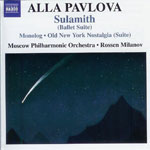Have European-schooled composers forgotten how to write fast-tempo tonal music? You’d think so on evidence of this CD. I’ve enjoyed other Naxos CDs of works by Alla Pavlova, a Russian-trained composer who has lived in New York since the early 1990s. But nothing in this hour-and-a-quarter moves more quickly than a slowish Allegretto. Pavlova has a knack for writing good tunes and puts a lot of them in these three thoroughly tonal, even Romantic, compositions. They are reminiscent of the Russian-influenced melodies that Dmitri Tiomkin wrote in his film scores, or of popular Moscow ballads.
The six-minute Monolog for violin and strings is the most Classical of these pieces; it makes exactly the sort of impression as works like the Chausson Poème for violin and orchestra. Old New York Nostalgia adds an attractive blues element, using solo trumpet and two solo saxophones. The version recorded here is the six-movement 2002 revision. To the original four movements Pavlova added a new opener (“From My Mom’s Photo Album”) featuring a charming old-world violin melody, and a post-9/11 piece, “Lullaby for the Twins”. The restrained sadness of this short work strikes just the right mood. It conveys more sincerity in its three-and-a-half minutes than we hear in the entirety of such overblown wallows as Adams’ On the Transmigration of Souls.
Pavlova’s penchant for slow melodies turns downright boring in the 45-minute orchestral suite from the ballet score for Sulamith. The ballet is about the love and sacrifice of a serving girl (Sulamith) for King Solomon, but the impression we get from this suite is of blandness: the love music lacks urgency and passion; the ritual dances are deprived of energy and excitement. The film composer that this music ultimately reminded me of was not the lively and inventive Tiomkin, but rather the ponderous Hans Zimmer.
The orchestral performances and the individual soloists are of very high quality, and the disc sounds good throughout. Sure, I’d rather have sustained, unrelieved prettiness, as here, than sustained, unrelieved ugliness. But there has to be something more than that.
































